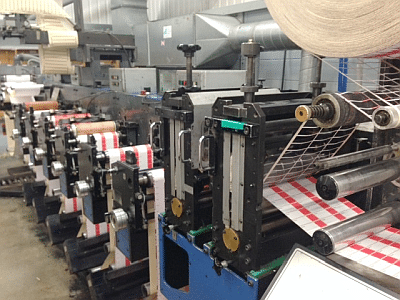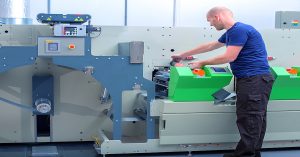Dealing with press operator poor performance issues can be frustrating. It can be complex and time consuming to make sure you get the right result – an improvement in their performance, or failing that, them being managed out of the organisation in a fair and legal way.
It is likely you will meet with a poorly performing press operator at least twice; the first time to tell them how their performance is ineffective and set targets for improvement, and the second to review their progress and decide about their future. Press operator poor performance leads to waste, redo’s and effects profitability.
Why Does Press Operator Poor Performance Exist?
They are performing badly because they don’t have the right experience for the job but convinced someone that they did. This could also come from an inexperienced manager with no industry experience. Managers need to hire employees that are plug n play and have ran the specific printing press and loves his craft. Companies cannot afford the time and loss of profits in hiring someone that will take months to train. But if the wrong hire was made, you must have a conversation before showing them the exit door.
 In practice, you may have several other steps to follow, but the conversations will follow the same pattern, and if you master that pattern, you will find it easier to deal with any conversation about performance effectively.
In practice, you may have several other steps to follow, but the conversations will follow the same pattern, and if you master that pattern, you will find it easier to deal with any conversation about performance effectively.
And what is the pattern? You prepare. You talk. You listen. You consider. You decide. You communicate your decision. In basic terms, it is as simple as that.
Preparation involves making sure you know company policy and what authority you must make decisions; you know where the press operator poor performance falls short (and you have specific examples), you’ve planned how you want the meeting to go, you’ve given the employee appropriate notice and information in accordance with company policy, and you’ve identified a suitable time and venue.
Next, you talk. You may have a predetermined structure to follow or perhaps an agenda you have drawn up, in either case, you need to explain the reason for the meeting and what you want to achieve – to discuss the press operator poor performance issues and what needs to be done about them.
Then you give them the evidence of their performance shortfalls. Now you give the employee, the opportunity to talk and you need to listen. The quickest way to make sure someone doesn’t engage with you is to make them think you’re ignoring what they say. And the only way you are going to get an improvement in performance is if they are working harder, better, or differently. You need their participation. That said, if they refuse to make the effort, then you can still act. It’s not about handing over control. It’s about managing the situation.
It may be that there are some issues that you’re not aware of. They may not have been trained to carry out that task. They may have to rely on a third party which is causing the problems. They may have a health problem that impacts on their ability. There can be as many reasons as there are staff.
They may also get emotional. You might face anger or distress. You can never tell how someone will react until you’re in that situation. Don’t let this side-track you. If they become too emotional to carry on, take a break, but always make sure you get back to the matter at hand.
Generally, having evidence of performance issues makes it easier to deal with any emotional reactions since it is harder to ignore facts. It also helps you deal with those who might use an emotional reaction as a tactic to delay the discussion.
This leads neatly on to considering the information you now have. No effective manager would make a business decision without having the relevant facts or without weighing the options. Performance management is as much a business decision as any other issue you will face. Staff pay is often the biggest budgetary outgoing, where even the lowest press operator can cost tens of thousands over the course of 2 to 3 years. Dealing with press operator poor performance issues is a key opportunity to ensure you get the best return on that hiring investment.
Decision Time on Press Operator Poor Performance
Now you have the decision to make. You’ll know from your preparation which options are open to you: it may be a verbal or written warning, it may be dismissal. Whatever it is, ensuring that you have been fair and followed policy will mean your decision is more likely to stand if the press operator decides to challenge it. It would be unfortunate to end up fighting a legal battle and losing, just for the sake of following the process properly.
Once you have made your decision, you need to communicate it to the employee. This needs to be done in the most appropriate way. Face-to-face is usually best, with written confirmation including an action plan. This should be given to them as quickly as possible to both capitalize on the momentum from your discussion and to reinforce its importance. There should also be clear demarcation between responsibilities, especially since that press operator is the key person who can improve their performance.
And how do you know if you get it right? The employee goes away knowing what they must do, how they must do it, when they need to do it by, they have no illusions about the part they must play, they know the support they can expect from you and the organisation, and they understand the consequences of not meeting their targets.
And finally, it can be uncomfortable for any manager having to have these discussions with the employee about press operator poor performance, but if you do it in a fair, reasonable and supportive way, you can be their biggest ally, even if, in the end, it doesn’t work out.
Avoid Most Press Operator Poor Performance Before the Hire is Made
Have the press operator candidate work side by side with your Lead Operator for a day or two if possible. You can then evaluate his / her performance and more importantly see how this candidate fits in with your team. In the working interview compensate the candidate at a lower rate while evaluating him.
Or call on The Marathon Group to recruit the plug n play press operators whom are team players that have been evaluated and researched with other operators in the plant through personal references not supplied by the candidate.








